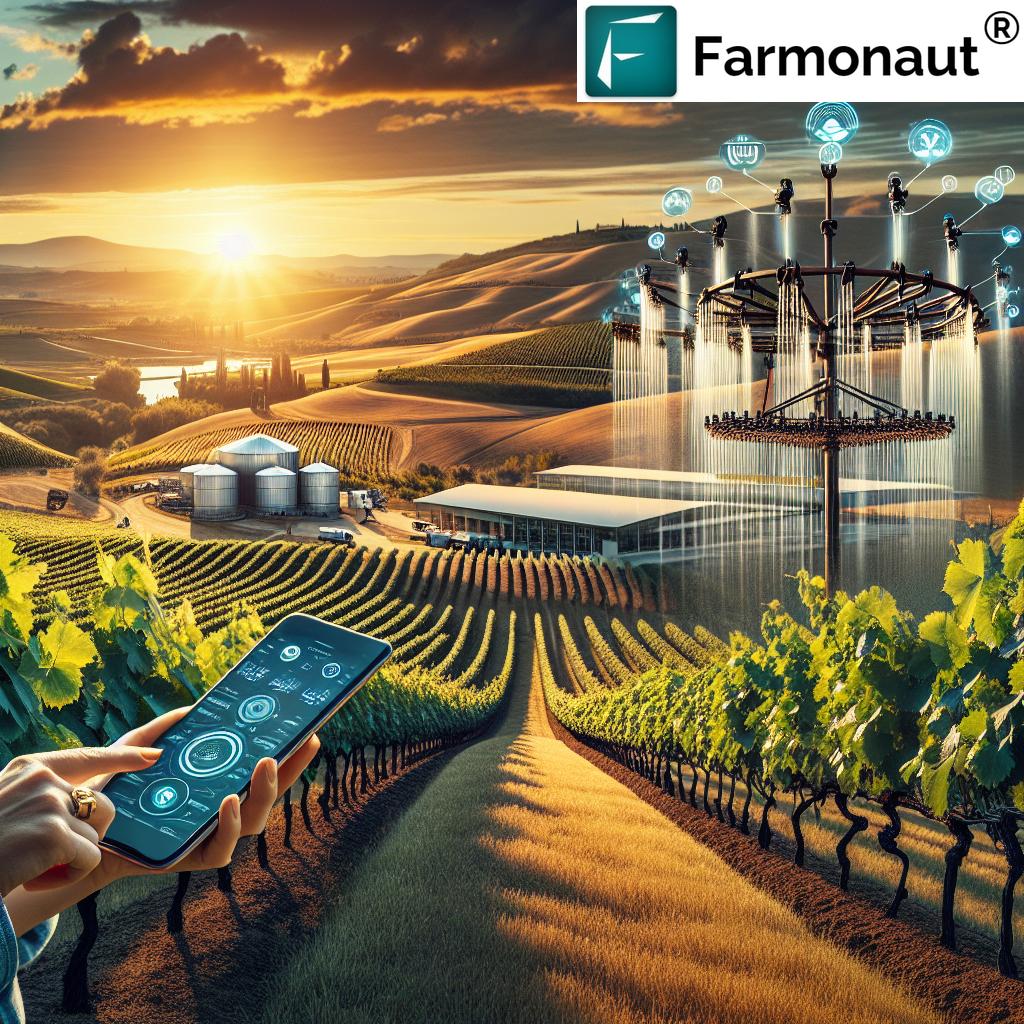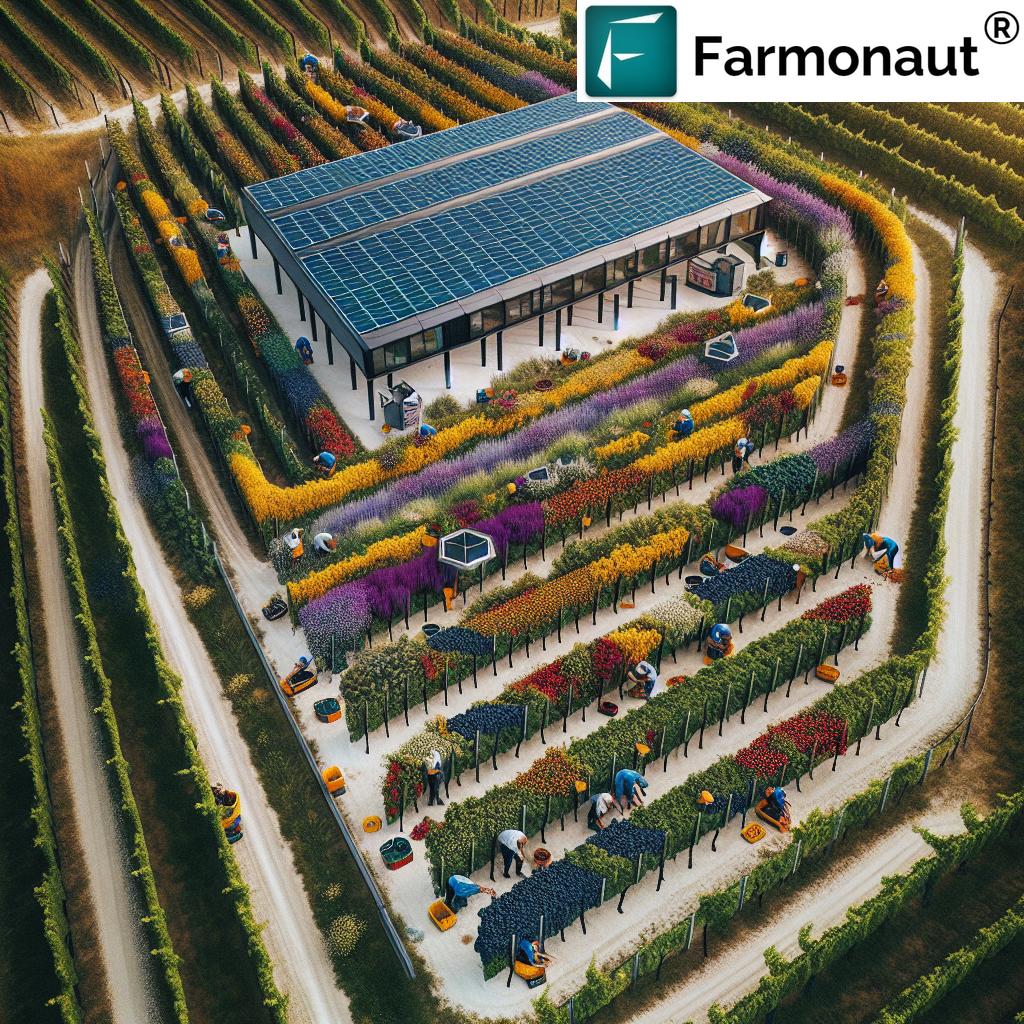Revolutionizing Italian Grape Farming: AI-Powered Sustainable Agriculture from Farm to Fork
“AI-powered systems in Italian vineyards optimize growing conditions for table grapes, improving quality across 100% of the supply chain.”
In the heart of Italy’s lush countryside, a quiet revolution is taking place. The traditional art of grape farming is being transformed by cutting-edge technology and sustainable practices, setting a new standard for agriculture across Europe. We’re witnessing a remarkable shift in how grapes are cultivated, processed, and distributed, with Italy leading the charge in sustainable agriculture and food safety.
As we delve into this fascinating world of Italian grape farming, we’ll explore how the integration of artificial intelligence (AI), precision agriculture techniques, and a commitment to environmental stewardship are reshaping the industry. From the vineyard to your table, every step of the process is being optimized for quality, efficiency, and sustainability.
The Farm to Fork Model: A Blueprint for Sustainable Agriculture
At the core of Italy’s agricultural revolution is the “farm to fork” model, an integrated system that ensures rigorous quality control throughout the entire supply chain. This approach is not just about producing high-quality grapes; it’s about creating a sustainable and transparent process that consumers can trust.
The farm to fork model in Italian grape farming encompasses several key elements:
- Sustainable cultivation practices
- Advanced technology for crop monitoring and management
- Strict quality control measures
- Efficient and eco-friendly processing and packaging
- Transparent supply chain management
By implementing this comprehensive approach, Italian grape farmers are not only producing superior products but also setting a new standard for agricultural practices across the European Union.

AI in Agriculture: The Future of Grape Farming
Artificial Intelligence is playing a pivotal role in revolutionizing grape farming in Italy. From optimizing growing conditions to predicting harvest times, AI is enhancing every aspect of grape cultivation.
Here are some key ways AI is being utilized in Italian vineyards:
- Precision irrigation systems that use AI to analyze soil moisture levels and weather patterns
- AI-powered drones for aerial monitoring of crop health
- Predictive analytics for pest and disease management
- Automated sorting and grading systems for harvested grapes
These AI-driven solutions are not only improving the quality of grapes but also significantly reducing resource waste and environmental impact.
Organic Vineyard Management: Nurturing Nature’s Balance
Organic vineyard management is at the heart of Italy’s sustainable grape farming practices. This approach focuses on maintaining the natural balance of the ecosystem while producing high-quality grapes.
Key aspects of organic vineyard management include:
- Companion planting to promote biodiversity and natural pest control
- Use of organic fertilizers and natural soil amendments
- Integrated pest management strategies
- Water conservation techniques
By embracing these organic practices, Italian grape farmers are not only producing healthier grapes but also preserving the long-term viability of their land.
“Italy’s sustainable grape farming practices serve as a model for food safety and organic agriculture in all 27 EU member states.”
Precision Agriculture: Maximizing Efficiency and Quality
Precision agriculture techniques are revolutionizing grape farming in Italy, allowing farmers to optimize their operations with unprecedented accuracy. These methods combine advanced technology with traditional farming knowledge to maximize efficiency and quality.
Some key precision agriculture techniques used in Italian vineyards include:
- GPS-guided planting and harvesting
- Variable rate technology for precise application of inputs
- Remote sensing for real-time crop monitoring
- Data-driven decision making for farm management
By leveraging these precision agriculture tools, Italian grape farmers are able to produce higher yields of superior quality grapes while minimizing environmental impact.
Post-Harvest Technology: Preserving Quality from Vine to Table
The journey of a grape doesn’t end at harvest. Post-harvest technology plays a crucial role in maintaining the quality and freshness of grapes as they make their way from the vineyard to the consumer.
Italy’s grape industry employs cutting-edge post-harvest technologies, including:
- Advanced cold storage facilities with precise temperature and humidity control
- Modified atmosphere packaging to extend shelf life
- Non-chemical treatments for pest and disease control
- Automated sorting and grading systems
These technologies ensure that Italian grapes maintain their quality and nutritional value throughout the supply chain, delivering a superior product to consumers.
Food Safety Regulations: Ensuring Consumer Trust
Italy’s commitment to food safety is evident in its stringent regulations and quality control measures. These standards not only meet but often exceed European Union requirements, setting a high bar for grape production across the continent.
Key aspects of Italy’s food safety regulations for grape farming include:
- Regular inspections of vineyards and processing facilities
- Strict limits on pesticide and chemical use
- Comprehensive traceability systems
- Rigorous testing for contaminants and residues
By adhering to these strict standards, Italian grape farmers are ensuring the safety and quality of their products while building consumer trust.

Environmental Stewardship: Protecting the Land for Future Generations
Italian grape farmers understand that their success is intrinsically linked to the health of the environment. As such, environmental stewardship is a core principle of their farming practices.
Key environmental initiatives in Italian grape farming include:
- Soil conservation and erosion control measures
- Water management and conservation techniques
- Promotion of biodiversity in and around vineyards
- Reduction of carbon footprint through sustainable practices
These efforts not only protect the environment but also contribute to the production of higher quality grapes, showcasing the symbiotic relationship between sustainable farming and product excellence.
The Role of Technology in Sustainable Grape Farming
Technology is at the forefront of Italy’s sustainable grape farming revolution. From satellite-based crop monitoring to blockchain-powered traceability, innovative solutions are transforming every aspect of grape production.
Some key technologies being utilized include:
- Satellite imagery for crop health monitoring
- IoT sensors for real-time data collection
- Blockchain technology for supply chain transparency
- Machine learning algorithms for predictive analytics
These technologies are not only improving efficiency and quality but also contributing to more sustainable farming practices.
For farmers looking to leverage technology in their operations, Farmonaut offers a comprehensive suite of tools for satellite-based farm management. Their platform provides valuable insights for crop health monitoring, resource management, and sustainable farming practices.
The Future of Italian Grape Farming: Sustainability and Innovation
As we look to the future, it’s clear that Italian grape farming will continue to lead the way in sustainable agriculture. The industry’s commitment to innovation, quality, and environmental stewardship sets a powerful example for agricultural practices worldwide.
Key trends shaping the future of Italian grape farming include:
- Increased adoption of AI and machine learning technologies
- Further development of drought-resistant and disease-resistant grape varieties
- Expansion of organic and biodynamic farming practices
- Greater integration of renewable energy in farming operations
These advancements will not only ensure the continued success of Italy’s grape industry but also contribute to a more sustainable and resilient global food system.
Comparison: Traditional vs. AI-Powered Sustainable Grape Farming in Italy
| Aspect | Traditional Methods | AI-Powered Sustainable Methods |
|---|---|---|
| Irrigation Management | Manual scheduling based on experience | AI-driven precision irrigation based on real-time data |
| Pest Control | Scheduled spraying of pesticides | Predictive pest management using AI and IoT sensors |
| Yield Prediction | Estimation based on historical data | Machine learning algorithms for accurate yield forecasting |
| Environmental Impact | Often higher due to inefficient resource use | Reduced impact through optimized resource management |
| Labor Requirements | High manual labor needs | Reduced labor through automation and smart systems |
| Quality Control | Manual inspection and sorting | AI-powered sorting and grading systems |
| Resource Efficiency | Often inefficient due to lack of precise data | Highly efficient with data-driven decision making |
| Data-Driven Decision Making | Limited, mostly based on experience | Comprehensive, utilizing big data and AI analytics |
Embracing Technology for Sustainable Farming
For farmers looking to adopt these innovative practices, there are several tools and platforms available. Farmonaut’s API offers access to satellite imagery and weather data, enabling farmers to monitor their crops remotely and make data-driven decisions. Their API Developer Docs provide comprehensive guidance for integrating these powerful tools into existing farm management systems.
Additionally, Farmonaut offers mobile applications for both Android and iOS platforms, making it easy for farmers to access critical data on the go:
Conclusion: A Model for Sustainable Agriculture
Italy’s grape farming industry stands as a shining example of how traditional agricultural practices can be enhanced and revolutionized through the integration of cutting-edge technology and a commitment to sustainability. From AI-powered farming systems to stringent food safety regulations, every aspect of the industry is geared towards producing high-quality grapes while minimizing environmental impact.
As consumers become increasingly conscious of the origins and quality of their food, the Italian model of sustainable grape farming offers a blueprint for the future of agriculture. By embracing innovation, prioritizing environmental stewardship, and maintaining a steadfast commitment to quality, Italy’s grape farmers are not just producing exceptional fruit – they’re cultivating a sustainable future for generations to come.
The revolution in Italian grape farming is more than just a local success story; it’s a model that has the potential to transform agriculture on a global scale. As we face the challenges of climate change and food security, the lessons learned from Italy’s vineyards may well hold the key to a more sustainable and bountiful future for us all.
FAQ Section
- Q: How does AI improve grape farming in Italy?
A: AI enhances grape farming by optimizing irrigation, predicting pest outbreaks, managing crop health, and improving harvest timing through data analysis and machine learning algorithms. - Q: What are the key elements of the “farm to fork” model in Italian grape farming?
A: The model includes sustainable cultivation, advanced crop monitoring, strict quality control, eco-friendly processing, and transparent supply chain management. - Q: How does organic vineyard management contribute to sustainability?
A: Organic management promotes biodiversity, uses natural pest control methods, and avoids synthetic chemicals, leading to healthier soil and ecosystems. - Q: What role does precision agriculture play in Italian grape farming?
A: Precision agriculture enables targeted resource application, optimizes crop management, and improves yield quality through technologies like GPS-guided systems and remote sensing. - Q: How do Italian food safety regulations ensure grape quality?
A: Italian regulations mandate regular inspections, strict pesticide limits, comprehensive traceability systems, and rigorous testing for contaminants throughout the production process.






